Telling Better Stories
Journalism Training for Small Farm Educators
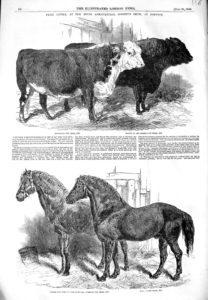 Are you an agriculture educator or service provider who tells stories of the farmers you work with to the public? Do you write articles, profiles, blogs, essays, take photographs, or produce podcasts about farmers? Are you a farmer writer or blogger? On April 11th, 2013, the Cornell Small Farms Program hosted a workshop called “Telling Better Stories” on the Cornell University campus. This full day workshop series offered professional journalism training on how to improve communication to the public. Participants learned how to fine-tune interview skills, use style appropriately, find reliable facts and sources efficiently, develop engaging narrative, take better photographs and create podcasts.
Are you an agriculture educator or service provider who tells stories of the farmers you work with to the public? Do you write articles, profiles, blogs, essays, take photographs, or produce podcasts about farmers? Are you a farmer writer or blogger? On April 11th, 2013, the Cornell Small Farms Program hosted a workshop called “Telling Better Stories” on the Cornell University campus. This full day workshop series offered professional journalism training on how to improve communication to the public. Participants learned how to fine-tune interview skills, use style appropriately, find reliable facts and sources efficiently, develop engaging narrative, take better photographs and create podcasts.
“Telling Better Stories” offered interactive, experiential learning in small groups. All attendees were required to submit one article/photo/podcast to the Cornell Small Farms Program following the workshop. These submissions are posted on our Story Share pages. For more information, see individual workshop descriptions and instructor biographies below.
Questions may be directed to Violet Stone at 607-255-9227 or vws7@cornell.edu.
Journalism Training for Small Farm Educators
Videos, handouts, and PowerPoints from the workshop are provided below. Photos and articles submitted by attendees featuring their new writing and photography skills are posted on our Story Share page here.
Workshop 1a: Focus on Fact-Finding (Nuts & Bolts Track)
Learn how to gather facts to make your stories informative and interesting. Bring your topics to the table and we’ll brainstorm together on public factual resources at your fingertips. Evaluating the information you gather is the most important part of any reporter’s search strategy. We’ll explore techniques for validity checks. Facts are what fill the stories about small farms and excite readers (and listeners). The specifics, the details, the nitty gritty. From using more first personal observational methods to satellite images from Google Maps, you will gain new ideas for fact finding and new skills in using internet search tools such as Google, Facebook, Twitter and LinkedIn. Workshop leader: Jill D. Swenson Workshop Handout | Instructor Bio
Workshop 1b: Can you Picture It? (Multi-media Track)
Photos: the Most Valuable Tool in Your Communications Arsenal
A picture is worth a thousand words, so make sure the photographs you are taking or using tell a good story. In this work shop we will go over basic photography techniques, free editing and organizational tools, and how to use them effectively. Workshop leader and professional photographer, John Suscovich, will share examples of photographs he has taken while working on the farm, looking at techniques such as framing, perspective, and lighting. We’ll also talk about how to use photographs to enhance written narrative. As an interactive group activity we will view and discuss several photographs, taken on farm, to pick out the strengths and weaknesses. Attendees are invited to bring 1-2 photographs of their own for group discussion. Workshop leader: John Suscovich Video of Session | Link to Instructor’s Web Pages | Workshop Handout | Powerpoint | Instructor Bio
Workshop 2a: Show AND Tell (Nuts & Bolts Track)
How to Make a Story Both Compelling AND Informative
Mud. Tractors. Escaped Cows. Hailstorms. Amber waves of grain. Readers love learning about farming, and the work that farmers do to make sure the rest of us are well fed. But making that story compelling and interesting means getting off the phone or e-mail and going to the farm. Drawing on his background in local newspaper reporting on agricultural issues and also as a vegetable farmer, Aaron will give a sense of how to not only how to interview and glean interesting information from busy farmers, but also how to conduct interviews when they may be too busy to sit down. In addition, he’ll discuss finding the most interesting parts of a story and using that to create a lead to a story or article. Finally, he’ll discuss how to show readers what the farmer is doing instead of telling readers about it, using techniques like dialogue, description, and action. Workshop leader: Aaron Munzer Workshop Handout | Instructor Bio
Workshop 2b: Do You Hear What I Hear? (Multi-media Track)
Basics of Podcast and Audio Clip Production
Some stories are better received out loud. A study performed by “eMarketer” projects that by the end of 2013 there will be 37.6 million people who download podcasts monthly, more than double the 2008 figure of 17.4 million. In this intro session to audio communications, you’ll learn about basic equipment and editing software needed to produce audio clips and podcasts. We’ll listen to a few farmer-themed podcast examples and talk about the components needed to prepare, record, edit and produce an engaging audio clip. Learn how to conduct an interview or create a script, add music or other sound layers, convert to accessible sound formats and get your audio stories out to the public! Workshop leader: John Suscovich
Video of Session | Workshop Handout | Powerpoint | Instructor Bio
Workshop 3a: Interviews, Quotes, and Writing Dialogue Style (Nuts & Bolts Track)
Learn who to interview to make your story interesting to readers, how to prepare questions in advance to get the best leads, and how to write up your interview when you return from the field. Who you interview depends on the questions you’ve got to ask. Who provides you with answers also depends upon who they are and what motives they may have in going “on the record” for a magazine article. Eyewitnesses, participants, first-hand experts in the farm practices, and farmers made for good interview sources. There may also be institutional sources in business, government or the non-profit sector who can answer your questions. Asking the right person the right question is the role of the writer. Planning your interview in advance is a technique you’ll learn more about in this practical workshop. The mechanics of journalism writing style for quotations and attribution will be covered; including grammar and punctuation. Finding the right characters and voices to include in your research and reporting will lead you to the heart of the story. And help you identify the most powerful quotes from your interview. This hands-on workshop involves using examples of actual interviews, quotes, and attribution of sources. Workshop leader: Jill D. Swenson Workshop Handout 1 | Handout 2 | Instructor Bio
Workshop 3b: Reincarnation: Adapting Your Story for Multiple Audiences (Multi-media Track)
The stories you tell as a writer have immeasurable value and can often be adapted to many different audiences. Learn how to find a story, craft it to fit an audience from a specific venue, and then keep it alive by reshaping it for other outlets. In this session, you’ll also learn to find different stories within a single interview, and then to take these on the road to different writing outlets. Finally, you’ll discover how to find magazines and other venues to pitch your work to, and then to use this knowledge to extend the reach of your writing. Workshop leader: Kara Cusolito Worksheet | Instructor Bio
Workshop 4. Big ideas. Small words. Short sentences.
What Online Readers Want, and How to Write for Them
Today’s readers don’t read – they scan. To reach them, you need the content they want and you need to present it in a style that they can easily digest. This session will include easy writing and design tips you can put to work immediately to make your websites, social media, newsletters and other publications more user-friendly. Workshop leader: Craig Cramer Video of Session | Instructor Bio
Agenda: Choose 1 of 2 workshops per session
| 10:00 – 10:10 |
Welcome & Overview |
|
| 10:10 – 11:00 |
Concurrent Session 1 |
|
| Nuts & Bolts Track | Multi-media Track | |
| Focus on Fact-Finding | Can you Picture it? Photos: the Most Valuable Tool in Your Communications Arsenal | |
| 11:00 – 11:10 |
Break |
|
| 11:10 – Noon |
Concurrent Session 2 |
|
| Show AND Tell: How to Make a Story Both Compelling and Informative | Do You Hear What I Hear? Basics of Podcast and Audio Clip Production | |
| Noon – 1pm |
Lunch and Networking |
|
| 1pm – 1:50 |
Concurrent Session 3 |
|
| Interviews, Quotes, and Writing Dialogue Style | Reincarnation: Adapting Your Story for Multiple Audiences | |
| 1:50 – 2:00pm |
Break |
|
| 2:00pm – 2:50 |
Session 4 |
|
| Big ideas. Small words. Short sentences. What Online Readers Want, and How to Write for Them |
||
| 2:50 – 3:00pm |
Closing |
|
Instructor Biographies
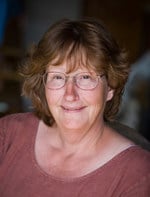 |
Jill D. Swenson, Ph.D., taught journalism for 20 years, first at the Henry Grady School of Journalism at the University of Georgia and later in the Park School of Communications at Ithaca College. She is president of Swenson Book Development, LLC and assists authors write, publish and market their books; specializing in narrative non-fiction and memoir. |
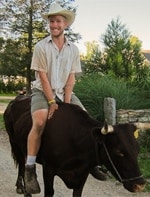 |
John Suscovich is the Founder of Farm Marketing Solutions. A media rich website geared toward strengthening the marketing efforts of fellow farmers. As host of the Growing Farms Podcast he hosts weekly podcasts interviewing farmers from across the country, on the business of agriculture. He also runs a Pastured-Chicken and Culinary Herb CSA in Connecticut. John is happy to report he has a daughter due July 12th of this year! |
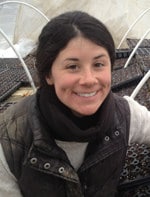 |
Kara Cusolito is a freelance writer and farmer based in Mecklenburg, NY. She has written both locally and nationally for newspapers and magazines, including the Ithaca Times and The Nation, among other publications. She owns and runs Plowbreak Farm, a 2.5 acre, 50-share vegetable CSA with her partner Aaron Munzer, and is also garden manager at the Ithaca Children’s Garden. |
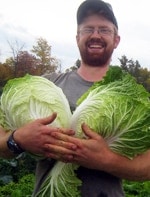 |
Aaron Munzer is a former reporter for the Ithaca Journal. He currently farms 2 1/2 acres for a vegetable CSA with his partner Kara Cusolito at Plowbreak Farm, and is the assistant manager of the Ithaca Farmers Market. |
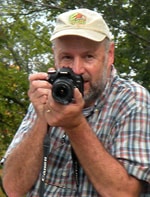 |
Craig Cramer is the communications specialist in the Department of Horticulture at Cornell University, where he develops and maintains websites, blogs, writes articles and news releases, shoots and edits photographs and video, and more. He was an editor and editorial director of The New Farm magazine from 1984 to 1995, and developed one of the first websites for farmers in 1997. You’ll find his personal garden blog at ellishollow.remarc.com. |


Thanks for sharing these resources!